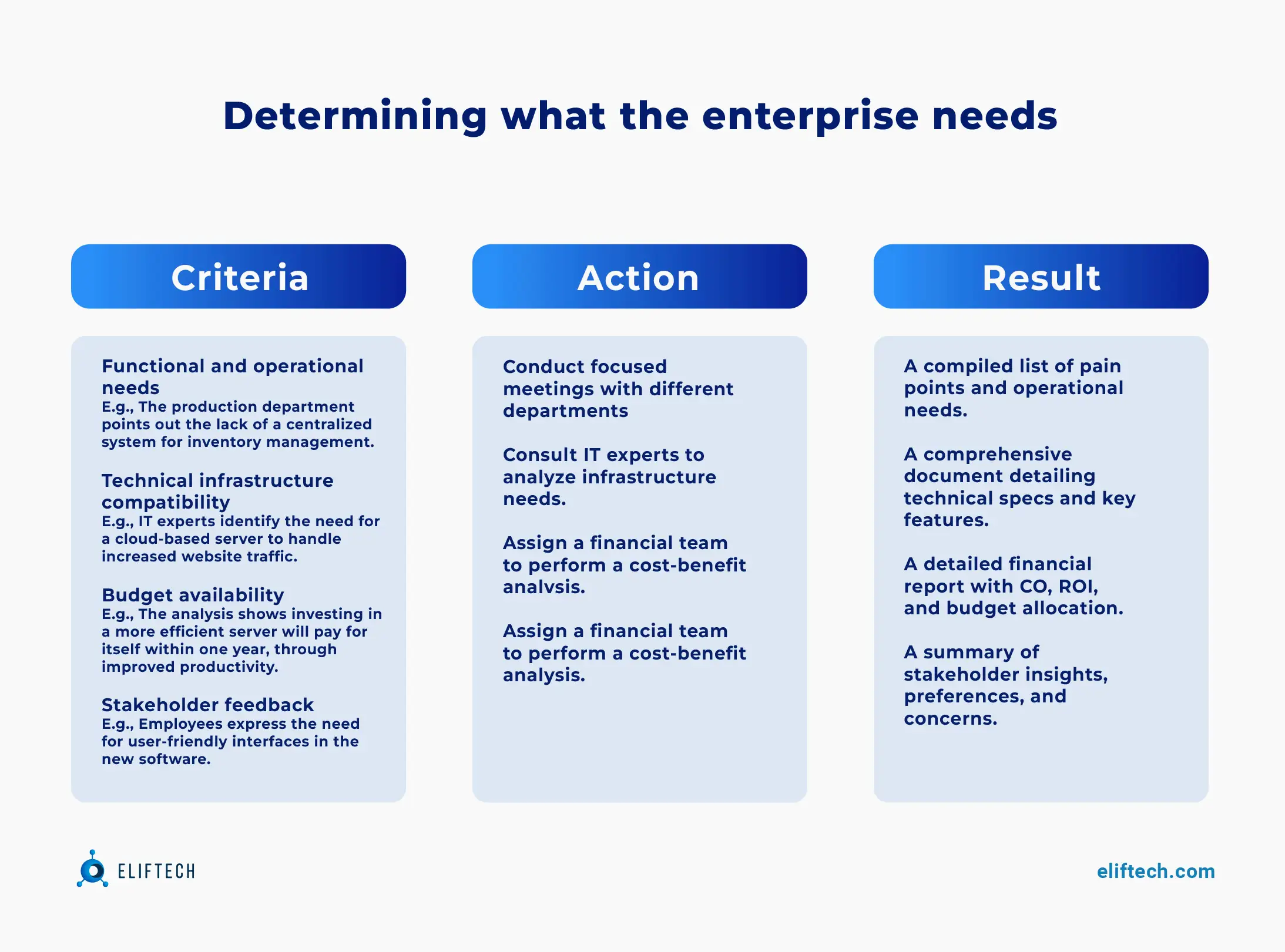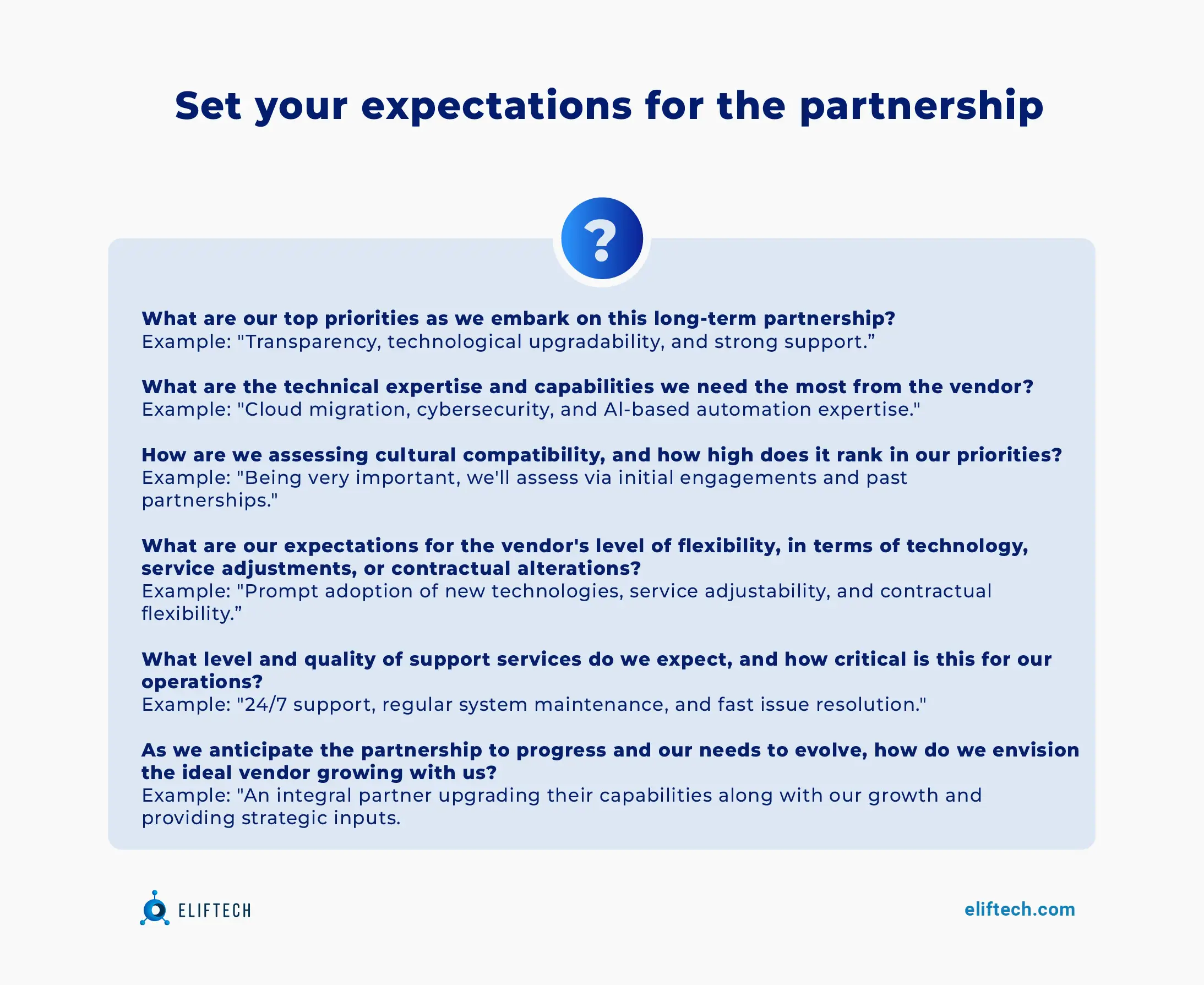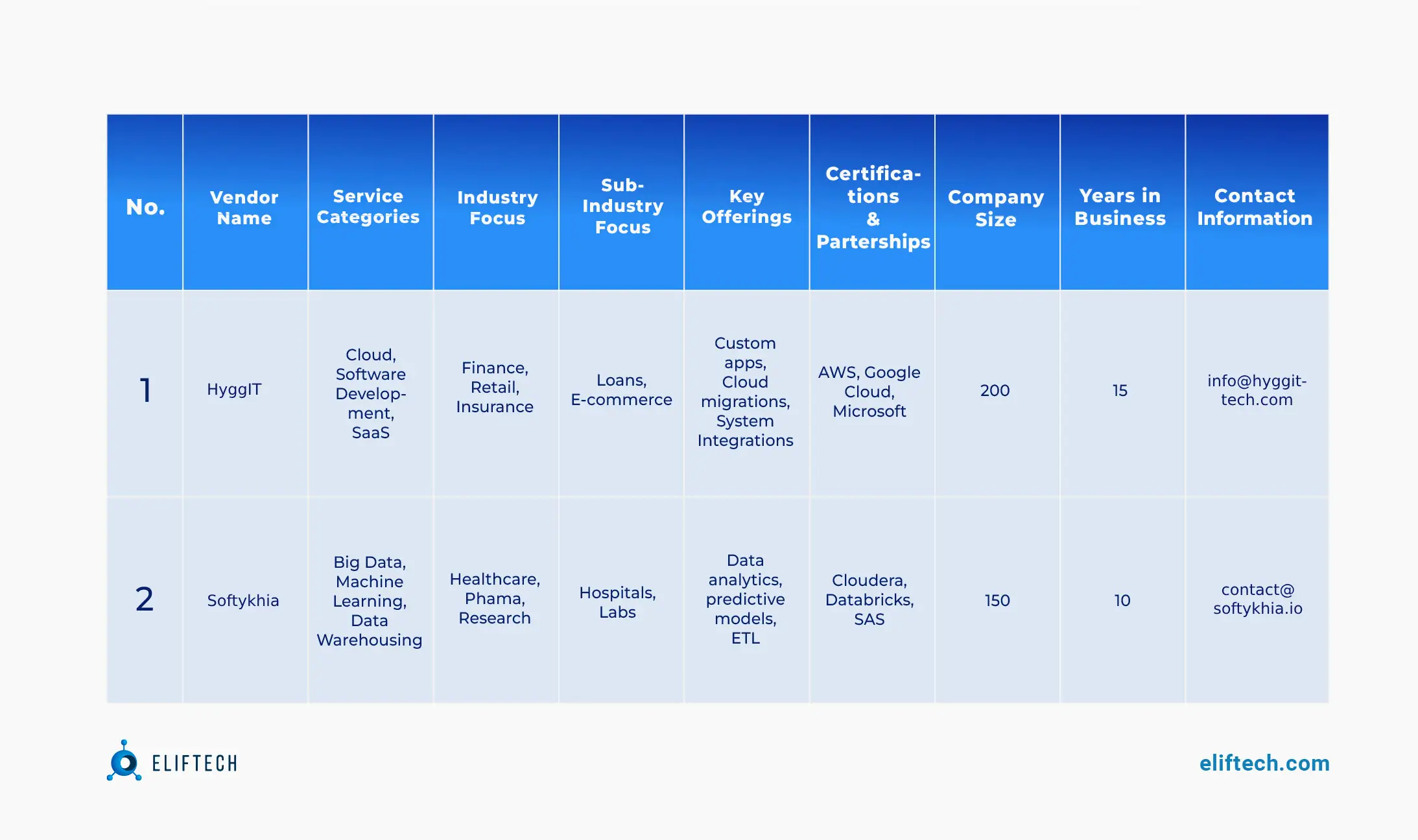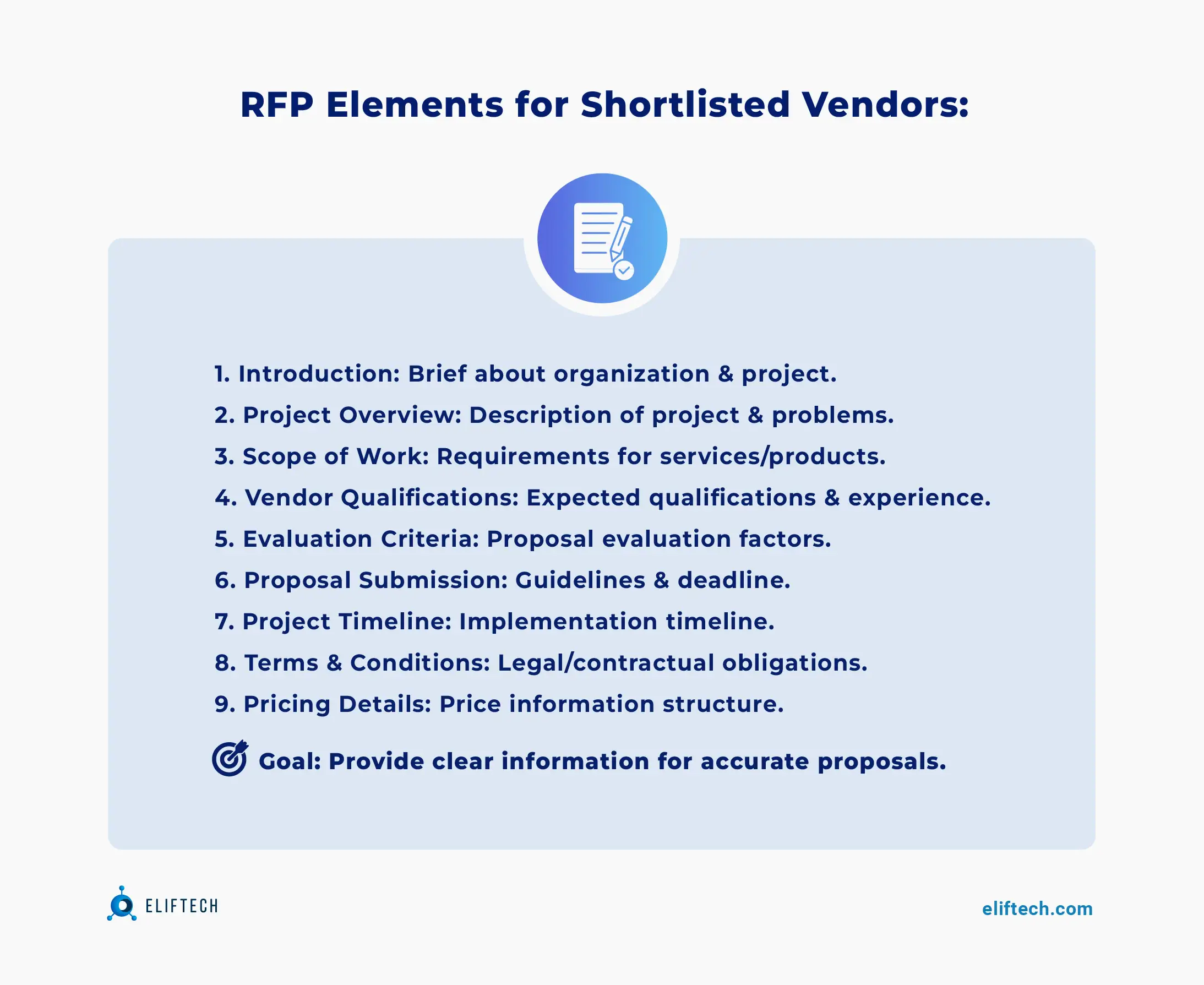Outsourcing
IT Vendor Selection: Checklist for Enterprises to Save

IT vendor selection for your company may seem quite simple to the uninitiated – you just define the vendor selection criteria and the budget, look briefly through Clutch reviews and references, and voilà… right? Turns out, this short path is only okay for short-term projects you are 100% sure will not become long-term partnerships.
In the meantime, “all things digital” have gotten so interconnected that it’s more beneficial to pick vendors who can handle long-term relationships (with all the deep understanding and extended tech stack) than try to disentangle the multiple projects. In other words, IT vendors are becoming digital partners (at least, ideally).
Enterprises tend to need an advanced, effective IT infrastructure that can handle the new demands of the business environment. It's estimated that 72% of businesses are already leveraging IT outsourcing for this very reason. But not every outsourcing company is ready or willing to take on a partner’s role.
In this guide, we'll provide a roadmap to choosing the IT outsourcing partner, covering selection processes, key considerations, industry-specific advice, and checklists you will surely like to bookmark for future reference.
What does the IT vendor selection process look like?
In an enterprise, decision-makers approach IT vendor management as a balance of strategic alignment, cost-effectiveness, technical compatibility, regulatory compliance, and user impact. The goal is to opt for a solution that contributes to business goals while ensuring value for money and minimal disruption to daily operations.
Add the considerations of technological compatibility, long-term adaptability, scalability, and data security, and it quickly becomes a decision of paramount importance. Making the right choice in this web of factors is no simple task.
However, with a more structured approach and good navigation, this can feel less daunting. This is what the process ideally looks like from the vendor’s side.
Step 1: What does my enterprise need?
At this stage, decision-makers may feel a combination of optimism and uncertainty. To make sure the process will address the company's IT needs, start by understanding the organization's specific IT needs and requirements, then identify any issues or gaps within the current system or infrastructure. For instance, for healthcare software development services, the request must consider compliance with regulations such as HIPAA, data security protocols, patient data management, and the integration of medical devices or systems.
Keep in mind both immediate and long-term IT demands, and explore possible interdependencies for future vendor collaboration – that is, whether you’ll need a different vendor after a year and a half.

Step 2: What do we want from the vendor?
Next, the focus is on defining what we want from a future vendor, aka our top priorities for this partnership, and what aspects we will not compromise on. This crucial exercise emphasizes defining clear partnership parameters but also helps shape a robust framework for our future collaborations.

Step 3: Evaluating potential vendors & creating a vendor list
When we proceed to IT vendor selection, the challenge lies in evaluating potential vendors and narrowing down your search. This 'exploration phase' requires striking a balance between thorough market research and an efficient decision-making process. For instance, software development services for startups and large enterprises would differ in scope, scalability, budget, and required expertise.
The difficulty stems from the multitude of vendor options, heterogeneous services, and varying levels of compliance with your unique requirements. To ease this evaluation process, consider the following software vendor evaluation checklist:
- Ask yourself: Beyond just providing the needed services, are they also experts in your industry?
- Dig into their case studies. Comparing those similar to your tech stack can provide helpful insights.
- Take to the Internet and leaf through customer reviews and discussions on online forums. These can be gold mines, revealing both the treasure and the traps.
- Poke around their blog and recent news. Get the pulse on their current focus and how actively they're staying involved in the industry.
This mission should end with a shortlist of vendors who align best with what your company really needs and stands for. The list should highlight concise but crucial information on the vendors’ services, experience, key offerings, and industry focus, as well as any certifications and contact details. Similar steps also apply to changing a vendor, in which case you will need an IT transition plan.

Get a copy of an IT Vendor Evaluation Checklist to streamline your selection process.
Step 4: Sending requests for proposals (RFPs) to shortlisted vendors
Once your shortlist is ready, the next step is to send Requests for Proposals (RFPs) to each selected company. You can think of an RFP like your wishlist – a formal document that lays out just what you're after, right from your IT needs to budget and timelines.
Sending out RFPs is sort of like giving each vendor a gentle nudge – it encourages them to thoroughly examine your needs and bring their A-game. This step aids in making informed decisions, as it allows comparison of what each vendor offers.
After receiving all RFPs, your team can commence a detailed analysis of each proposal to identify the best fit for your IT requirements.

Step 5: Conducting interviews & negotiating contracts
That’s where things really get interactive. Arrange comprehensive discussions with potential vendors, conduct interviews, ask for demonstrations, or start trial periods. It will help to assess how their solutions could fit into your organization.
However, you shouldn’t just look for someone who can get the job done. You're scouting for a software development partner who will be there, as you chart your business journey together.
After choosing the right vendor, begin contract negotiations. Outline your expectations, success metrics, and partnership rules. Draft a comprehensive Service Level Agreement (SLA) to ensure everyone is aligned, laying the groundwork for successful collaboration.
Step 6: The vendor is finally chosen. What’s next?
So you've finally picked your vendor and you’re sure they're the right fit for your needs. Now comes the exciting part – the 'implementation phase' is on, and you get to work together.
But what are the software vendor selection criteria in the first place? What are the basic ones and what are especially relevant for large enterprises? Having them in the first place gives you an edge in finding a reliable partner. So, as you start to sync up and collaborate, you'll see how your choice paid off and everything comes together nicely.
Basic IT vendor selection criteria
We all know this: every company is unique and what works for one, may not work for another. When choosing a vendor, this couldn't be more true. But there are a handful of fundamental considerations that cover pretty much every company, big or small.
Why are these basics important? Simply because they are a foundation for your vendor qualification checklist. While bigger corporations may need a few more bells and whistles, these foundational elements are crucial to any company seeking to outsource their needs.
1. Vendor background (Years in business, clients, pricing, geography, etc)
Think of the vendor's background as their job resume. It paints a picture of their experience, stability, and skills. You'll want to dig into how long they've been around, who they've worked with, and if they're in good financial standing.
Key points to consider here are:
- Years in Business: Are they new kids on the block or seasoned pros? When a vendor's been around for at least a few years, it usually means they can bring a bunch of skills and experience to your project. Plus, their track record usually suggests they're pretty good at solving problems and keeping clients happy.
- Previous Clients: Who have they worked for? The bigger and more reputable clients they've served, the better, as it's a positive sign.
- Reviews and Reputation: What are others saying? Snapshots from real experiences can guide your expectations. Consider checking review websites specific to the IT industry, like Clutch, G2, or Capterra. LinkedIn testimonials can also provide insights into their professional conduct. While their official website may have customer testimonials, always look for independent third-party reviews for an unbiased perspective.
- Awards and Recognitions: Reviewing the industry recognitions that a vendor has received can signal their level of expertise, innovation, and commitment to delivering quality products and services.
- Geographical Coverage: You need to make sure they can cater to your geographic needs. Vendors with broad geographical coverage can ensure consistent service delivery, regardless of where your business is located. Additionally, they might be better equipped to understand and comply with regional laws and customs.
- Financial Health: Is their financial house in order? This portrays their reliability and chances of a long-term partnership without financial hiccups. To check, ask them directly or review their financial statements if they're publicly available.
- Pricing: A vendor's pricing isn't just about the bottom line, but also what's included and what's not. Be sure to get a clear, detailed breakdown to avoid future surprises. Consider the different components like core service, support, and any extra features. Compare their price with the market average to ensure you're bagging a good deal. Also, understand their pricing model (hourly, project-based, or subscription) to ensure it aligns with your budget and can scale with your growth.
2. Technical capabilities (Delivery models, methodology, data and other processes)
The vendor’s offer might look impressive on paper – but how does it actually perform “on the road”? Check these criteria to get firsthand insights into the potential vendors' technical skills and assess whether they're a perfect fit for your business. You'll want to focus on:
- Delivery Models: It's not just about what a vendor offers, but also how they get it to you. Is it on-premises or cloud-based? Will it involve self-service where you'll manage things yourself, or is it full-service where the vendor takes care of everything? Also, consider whether you're looking at a project-based delivery or retainer-based. Understanding these helps decide if their model aligns with your specific needs, resources, budget, and strategic objectives. Just like pricing, it's critical that the delivery model also provides a good fit for your needs.
- Methodology and Process: This encapsulates a vendor’s work approach and protocols. Do they leverage established industry practices, or have they uniquely crafted their own methods? Are they using well-known methodologies like agile, lean, or waterfall? Also, look at their processes: How do they manage project timelines? What quality assurance measures are in place? What are their methods of communication and collaboration? It’s crucial these aspects dovetail with your own work styles and preferences.
3. Their project management style
A selection of a vendor for any sort of company (small or big) also involves careful vetting and evaluation of their project management capabilities. It’s particularly critical for large organizations due to the scale and complexity of their projects. Having a vendor capable of smoothly navigating through a project lifecycle without sacrificing quality can be a game-changer.
Here are three primary areas to focus on:
- Project Management Capabilities: This is all about how a vendor runs the process. Check out how they plan, organize, and get stuff done. Can they handle surprises along the way? Keep an eye on how well they juggle resources and deadlines. To assess this, review their past projects, ask for client references, and discover the tools and processes they use.
- Deployment Speed: Timing is everything when it comes to how a vendor does their thing. Can they get their solution running in your company swiftly to match your schedules? Sure, a speedy deployment could be a sight for sore eyes, but watch out for hasty mistakes. As always, good things come to those who don't sacrifice quality for speed. To test their delivery pace, you could tap into their usual timelines, check their record on other projects, chat about any aids they use for quicker deployment, and understand how they marry quality with speed.
4. Compliance & certifications
It's vital to examine how a vendor adheres to various security practices, compliance requirements, and possesses and relevant certifications. It covers following areas:
- Security Practices and Compliance Requirements: How does the vendor handle data privacy, information security, and regulatory requirements? Explore their security policies, procedures, and safeguards to ensure your project's security and compliance with industry standards.
- Standard Certifications: Confirm if the vendor holds essential certifications such as ISO, SOC, or others, indicating their commitment to internationally recognized standards, quality management, and risk mitigation.
- Industry-Specific Certifications: Assess if the vendor has certifications specific to your industry (e.g., HIPAA, PCI DSS, GDPR), demonstrating their specialization and ability to comply with relevant regulations and legal requirements.
- Technological Certifications: Check if the vendor's team holds certifications in key technology platforms, tools, and methodologies, displaying their technical competence and know-how in utilizing cutting-edge technologies.
5. Support & services
When searching for the perfect vendor, it's easy to get lost in the technical details, pricing, and features. But it's equally important to consider the level of support and services they provide. A vendor that excels in these areas can make the difference between a decent project experience and a truly seamless one.
- Customer Service: Does the vendor offer a responsive and knowledgeable team readily available to help you? Assess their communication skills and willingness to walk the extra mile when needed.
6. Cultural factors
The importance of cultural factors in software vendor selection is often underestimated, yet they can significantly impact the project dynamics and outcomes. When your vendor's culture aligns with your own, it promotes improved mutual understanding, smoother communication, and better synergy.
- Cultural Alignment: Try to understand if the vendor's values, principles, and work ethic should mirror your own.
- Cultural Diversity and Overall Work Culture: A vendor's commitment to diversity can bring various perspectives and innovative ideas. Plus, a wholesome work culture indicates a motivated team, which often results in higher-quality deliverables.
What are the IT vendor selection criteria for large enterprises?
For large enterprises, the entire IT vendor assessment checklist is wholly different from that of startups or smaller businesses. Typically, an extensive network of service providers caters to various organizational elements, but the increase in vendor volume shouldn't compromise the quality of partnerships. Accordingly, it may be a good idea to consolidate and foster fewer but full-scale strategic partnerships for long-term IT services.
Here are a few considerations tailored specifically to guide these businesses in making prudent, strategic vendor decisions.
- Experience with large-scale projects (preferably specific to your industry)
If a vendor successfully handled 'big jobs' in your industry, that's a big green light. It suggests they can handle your unique requirements confidently. These projects often come with heightened expectations and unique challenges, requiring specific skill sets to manage effectively. If a vendor has successfully navigated these waters, it implies they possess the knowledge, resources, and problem-solving abilities necessary for your project's scope and complexity.
For example, look at our experience with ClassWallet, a prominent US fintech company. Here, it wasn't simply about meeting baselines. We delved into their complex business processes, maintained clear communication with all involved parties, and met strict phased delivery timelines.
Why was this great for us? Well, it pushed us to utilize our expertise and creativity, building a solution that was uniquely suited to our client's requirements. And it cemented our belief that we can successfully take on big projects with their unique demands.
2. Scalability and infrastructure
Ensuring vendors can offer the requested services is fundamental, but it shouldn't be the end of your assessment. When seeking a long-term partnership, delve deeper into the potential scalability of vendors. Their infrastructure should not just cater to your present needs but should be adequately robust to accommodate your future growth and adapt to evolving requirements.
3. Sophisticated integration capabilities
A complex web of legacy systems often underpins large enterprises' technological structures. Simple integration isn't enough in such situations. You need IT service vendors offering sophisticated integration capabilities. This feature will ensure smooth merging of the new solutions into existing systems, ensuring optimal functionality and avoiding potential system conflicts. To check it, turn to the track record of their successful integrations similar to your requirements.
4. Training and knowledge transfer
In the modern business landscape, it's not just about making a solution; it's also about understanding it. In a good long-term partnership, the vendor doesn't just sell and walk away – they stick around to teach your teams the ropes. After all, who better to train your people than the guys who built the system?
A casual chat won't cut it when it comes to passing on technical expertise. They should be able to provide structured training programs, detailed documentation, and responsive support channels where your team can ask their burning questions. You might want to ask about their past training practices, and customer testimonials, or even request a demo training session. When a vendor is willing to invest in training your team, it shows their dedication to empowering your business –not just selling their wares.
Download your copy of our comprehensive IT Vendor Selection Criteria Template that succinctly summarizes both fundamental and enterprise-specific criteria, all arranged for your convenience in an easy-to-follow table.
Do all enterprises need to seek industry-specific expertise when outsourcing IT?
The short answer is, not all, but many do, especially big companies. Each industry has its own set of rules and problems. Going with an IT vendor who knows these from the start means you spend less time explaining and more time actioning. Take businesses in logistics, fintech, or healthcare as examples. They often deal with challenges that are quite unique to their field. Having a tech whiz who already understands these complexities means they can offer solutions that are tailor-made for these industries.
Healthcare
Healthcare is all about precision, privacy, and getting vital data fast. However, 80% of medical and healthcare data remains unstructured, making it challenging to process and analyze without specific technological expertise. Healthcare app development specialists with industry-specific knowledge can help to look after digital health records and ensure that patient data stays secure. They also know the ins and outs of complex health rules like HIPAA, thereby ensuring compliance and minimizing potential legal ramifications.
Sought-after industry-specific knowledge:
- Expertise in managing EHRs: As of 2021, 88% of U.S. office-based physicians have adopted some form of EHR, making EHR management a highly sought-after skill. Familiarity with popular systems like Epic or Cerner, which optimize EHR workflows, minimize data redundancy and save time.
- Data security: With the healthcare sector reporting 480 data breaches in the first three quarters of 2023, IT vendors need to offer robust and secure cloud storage solutions. These solutions should comply with regulatory standards, such as the Health Insurance Portability and Accountability Act (HIPAA), to protect patient information.
- Healthcare regulations knowledge: HIPAA non-compliance penalties can range between $119 and $1.5 million per year, IT vendors with an in-depth understanding of healthcare regulations like HIPAA are a top priority for healthcare enterprises.
Logistics
Logistics is all about moving stuff around – but it's not as easy as it sounds. An IT vendor with experience in logistics will know this. They'd know how to provide quality logistics custom software development services that can help track packages, ensure timely delivery, or manage warehouse inventory. They can provide IT solutions built with the logistics industry's unique challenges in mind.
Sought-after industry-specific knowledge:
- Expertise in developing and managing inventory management software. A square foot of warehouse and distribution centers in the United States costs about $5.08, logistics looks for domain expertise in vendors to introduce features like barcoding, RFID, automated pick lists, and real-time inventory tracking.
- Efficient fleet tracking and management systems. An IT vendor with a good grasp of GPS and telematics can develop software solutions, such as real-time dashboards, that provide valuable insights about the fleet.
- Skills in designing algorithms for supply chain optimization. 79% of companies with high-performing supply chains achieving revenue growth greater than the average within their industries.
Fintech
Ever used a banking app? Notice how they've made it easy to transfer money, pay bills, or check your balance? That's fintech for you. An IT outsourcing partner with expertise in fintech development services understands the importance of both user experience and security in this industry. They can help a fintech company build applications that not just meet their customers' needs, but also comply with financial rules and regulations.
Sought-after industry-specific knowledge:
- Proficiency in secure data storage and communication to ensure safe transactions. Skills in encryption can implement secure measures like SSL/TLS and end-to-end encryption, enabling businesses to conduct safe transactions while maintaining data integrity.
- Expertise in cloud technologies for scalable financial applications. Cloud platforms like AWS or Azure are essential in the fintech industry due to their scalability, security, and cost efficiency. Offering flexible access to applications and data, they allow financial applications to grow flawlessly with business needs while providing robust security measures. Not only does this eliminate the cost of installing and maintaining physical IT infrastructure, but it also expedites innovation by access to cutting-edge technologies. This makes the cloud service expertise more than just desirable; it's a necessity in the fintech landscape.
- Knowledge of common cybersecurity standards and compliance in the financial industry. With the average cost of a GDPR fine is 1,674.71, a software development partner with thorough knowledge can implement cybersecurity standards and financial industry compliance to protect clients' sensitive data, avoid hefty penalties, and build trust.
How to choose the right software development partner?
Partnerships, especially long-term ones, go beyond services offered or the costs involved. They resonate with the old adage, 'the whole is greater than the sum of its parts.' Look for vendors capable of synergizing with your business ethos, understanding your vision, and committed to supporting your growth narrative. Such partners will not just be vendors but extensions of your core team, building shared success stories over the long haul.
ElifTech creates custom solutions tailored to meet your unique business needs and goals, regardless of your enterprise's size or sector. Specialized in various domains, including fintech, logistics, eCommerce, and healthcare, we're skilled in crafting solutions that boost the efficiency and effectiveness of your operations.
Our expertise spans cloud computing, AI, big data, and more, equipping us to handle the complex demands of your business. Importantly, we offer flexible cooperation options, adjusting to your project requirements and working approach to provide a seamless, collaborative experience. In 2023, our efforts have been recognized among the top 10% of Clutch Global Winners. In addition, we were recognized as a Clutch Global Leader for our remarkable industry expertise and ability to deliver exceptional results.
